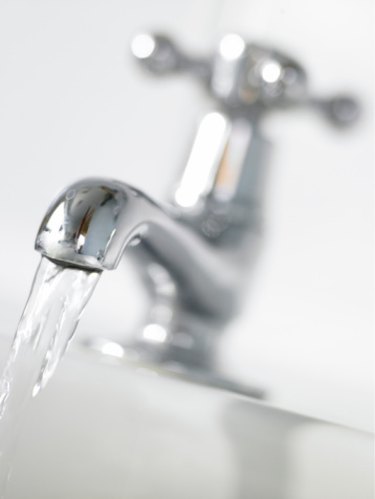
A plumbing faucet can make disconcerting noises when you turn it on or off. Whistling sounds can be particularly bothersome. Most noisy faucets can be silenced with a little detective work and a little economical, do-it-yourself remediation work. Begin with the most likely causes, and work your way through the simplest fixes before calling in the professionals to deal with problems that may be systemic and inadvisable for you to deal with alone.
Washer Problems
Video of the Day
Your noisy faucet may be the result of an incorrectly-sized or dislodged washer. Turn off the water supply to the faucet before initiating any investigative work. The turn-off valve could be your main water supply switch located in your basement, or you may have an easy-to-access zone valve located beneath the sink. Once the valve is disengaged, access the washer in your tap according to manufacturer's directions. Reseat a loose washer, or replace a worn or incorrectly sized one.
Video of the Day
Residue Issues
If you detect a residue buildup beneath or around the washer seat or inside the faucet stem, clear out what you can manually with a moist cloth, and treat stubborn residue with a cleaner that removes lime scale. Reseat with a new or freshly-cleaned washer and assess the results. If the noise persists, you'll need to check for a worn or binding washer thread.
Worn or Binding Threads
If turning the faucet handle produces a high-pitched, squealing whistle, the problem may lie with the metal threads of the faucet assembly. The threads of the stem may be rubbing against the faucet 's threads. Covering both threads with a coating of petroleum jelly should provide the lubrication required to stop the binding between surfaces. If the threads appear unduly worn, you may have to replace the parts rather than simply lubricate them.
Pipe Concerns
If you live in an older home or have galvanized pipes that build up scale or rust, the whistling noise may originate within your plumbing lines.The water pressure supplied to your home should measure less than 80 pounds per square inch. Higher velocities can cause the noise you are hearing. An inexpensive pressure gauge screwed onto a hose bibb can supply you with an accurate reading. You will need a plumber to install a pressure-reducing valve or replace the blocked pipe to solve the noise problem.